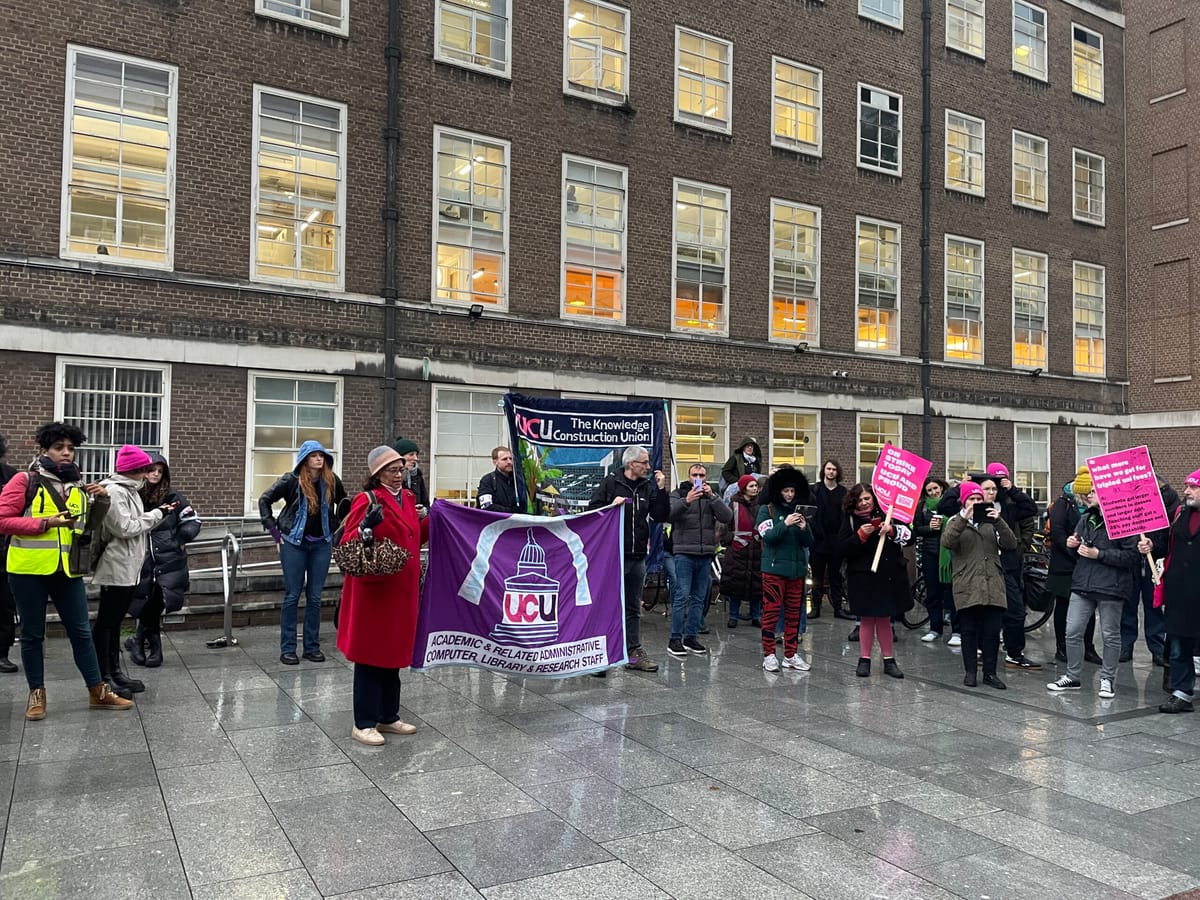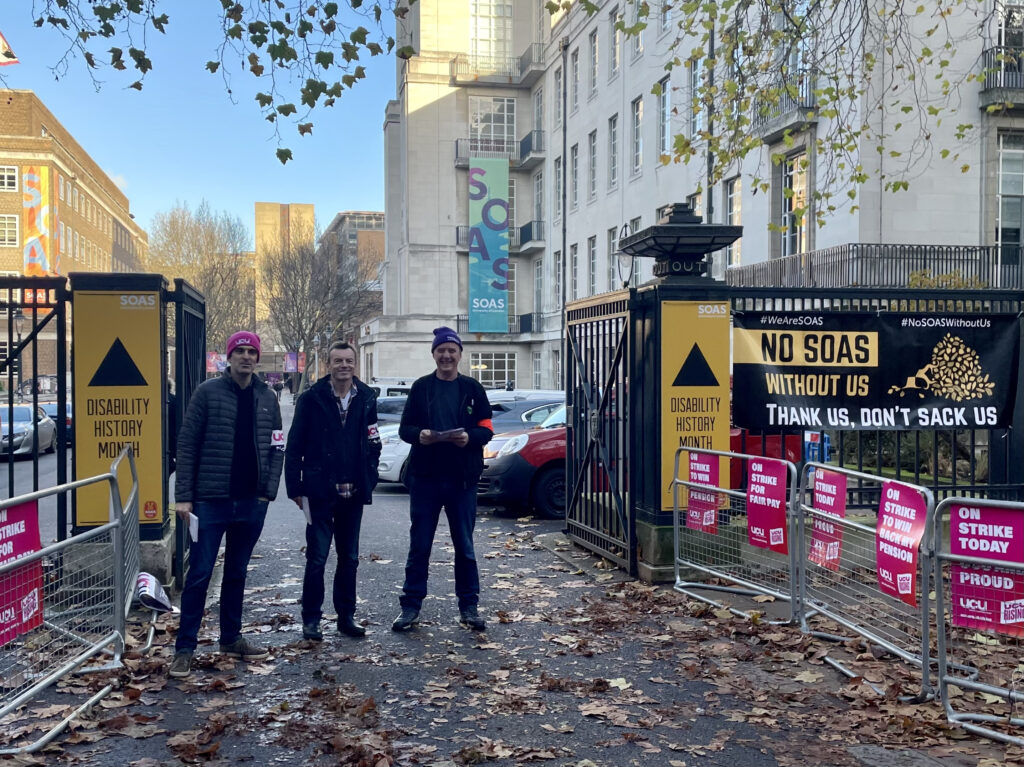SOAS UCU and UNISON Join Nationwide Strikes Across the University Sector

By Hala Haidar, BA Global Development
On 24, 25 and 30 November, SOAS UCU and SOAS UNISON branches joined nationwide strikes across UK universities. UCU strikes were seen across 153 universities and UNISON strikes across 19 universities. They totalled 70,000 striking university staff and impacted more than 2.5 million students, making it the largest university strike in the history of UK higher education.
In two national ballots concerning pay, working conditions, and pension cuts sent out in October, an overwhelming majority of UCU members voted in favour of strike action: 81.1% ‘yes’ votes for the pay and conditions ballot and 84.9% ‘yes’ votes for the USS pensions ballot. These results are especially significant because they are the first nationally aggregated ballots to successfully pass after anti-trade union legislation was announced by the Tory government in 2016. The UCU noted that university vice-chancellors did not make any revised offers to education workers following the results of the ballots.
The UCU represents academic and support staff in the further and higher education sector. The demands of the strike centre around two disputes: USS pensions and pay and working conditions. The demands around the USS dispute include renouncing the cuts made on the USS pension scheme in 2022 and certifying that future assessments of the financial health of the pension scheme are evidence-based and reasonable.
The demands of the second dispute include an increase of pay which would either take into consideration the rate of inflation + 2% or a 12% rise; to end the disability, gender, and ethnic pay gaps; a framework to cease precarious employment standards; action to confront ‘excessive workloads and unpaid work’; and for full-time employment contracts to be 35 hours without a decrease in pay.
Kerem Nişancıoğlu, SOAS UCU Branch Chair, explains, ‘While we’ve been facing long-term cuts to our pay—we’ve had around a 25% pay cut since 2009 in real terms—, this year that pay cut is particularly acute… [T]here’s a cost of living crisis in this country, inflation is through the roof, and inflation has massively outstripped what the employers have offered us in terms of pay. And so, for a lot of people, it’s simply a matter of survival to get a decent pay deal this time around.’
UNISON is a public service trade union that works across many sectors. In universities, UNISON represents non-academic staff, such as cleaners, security workers, administrators, and catering workers, who are generally the lowest-paid employees within the university. For most of the 19 UNISON branches who took part in this wave of strike action, including SOAS, this is their second strike since the start of term.

Sandy Nicoll, SOAS UNISON Branch Secretary, explains, ‘[T]his is not a national strike for UNISON because not all of the branches got across the threshold of 50%, but we did at SOAS and we did very, very easily because not only are we actually facing the cost of living crisis, we’re also facing the fact that two years ago the university put through a restructuring program, which meant that workloads are basically impossible for a lot of staff, and there’s a lot of anger about that.’
The UNISON strike demands a pay rise that will enable workers to deal with increased living costs. In May, the Universities and Colleges Employers Association offered a 3% pay rise, which university staff turned down. In a statement on November 21st, UNISON noted, ‘With the lowest measure of inflation currently 11.1%, the rise in living costs is three times greater than the workers’ pay increase.’
SOAS management shared their views on the strikes in a series of emails to students. On November 15th, Adam Habib, Director at SOAS, stated, ‘We do not believe such action will achieve the objectives people would like.’ On November 16th, Claire Ozanne, Deputy Director & Provost at SOAS, contended, ‘At SOAS, as an executive team we do not have the power to change the outcomes of the national discussions on pay and pensions. In place of this industrial action, we would wish to see continued national discussion and resolution to reach an agreement in the interests of staff and students.’
Nişancıoğlu highlights, ‘Our working conditions are fundamentally students’ learning conditions, and I know this is a slogan and something we say repeatedly, but it is fundamentally true. If we’re given the resources to do our work, that means a good education for students.’ In addition, he emphasises, ‘It’s the last resort, we’ve tried every other avenue to improve our work conditions…the only thing we can do is to use the only real power that we have in this institution, which is to withdraw our labour.’
“Nobody should be working full-time in a university and then have to go to a food bank to keep themselves alive and that’s what some of our members do, which is totally unacceptable.”
Nicoll concludes, ‘Nobody should be working full-time in a university and then have to go to a food bank to keep themselves alive and that’s what some of our members do, which is totally unacceptable.’
Featured Photo Caption: Opening rally at Birkbeck on day 1 of the strike (Credits: Hala Haidar).



